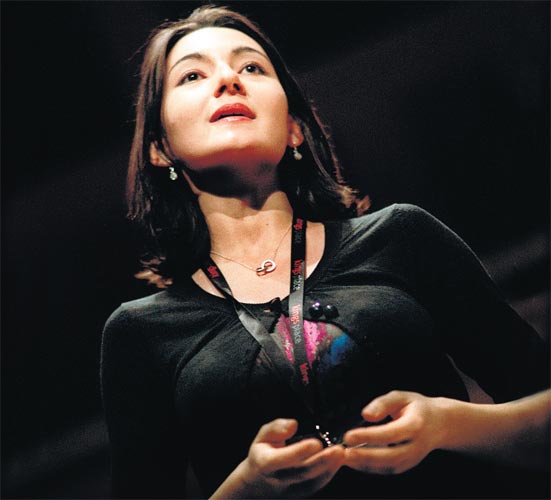Classical Opera Company, Kings Place, London<br/>Hagen Quartet/Uchida, Wigmore Hall, London
Haydn gets to grips with the digestive tract

Had you asked me a week ago to guess which Austrian composer had written an aria about constipation, my answer would have been Mozart. Wrong! The gently farting oboes, queasy violas, grumbling cellos and anxiously repeated "Ah!"s in Andrew Staples's effortless performance of "Per quell' che ha mal di stomaco" with the Classical Opera Company may not rival the sublime inventions of The Creation, Le matin, Le midi or Le soir. (How sublime can one be when setting lyrics about the laxative properties of rhubarb and cloves?) But they do prove that there was more to Haydn's sense of humour than the Surprise Symphony.
The 200th anniversary of Haydn's death has done little thus far to improve his reputation as an opera composer. Alert to nuances of light, shade and temperature, beguiled by the sun and the moon and enchanted by flora and fauna, the great 18th-century landscape painter shrivels on stage. Mood by mood, his arias are strong and vibrantly detailed. Yet character development eludes him, and the mixed emotions that Monteverdi, Handel and Mozart understood so instinctively are straitjacketed by dramaturgical convention. First in a four-concert survey of arias and symphonies from Esterházy, the Classical Opera Company's programme was an opportunity to admire Haydn's operatic writing without cringing at its weaknesses: to snort at the proctological humiliations of "Per quell' che ha mal di stomaco", to thrill to the distracted coloratura of "Amore nel mio petto" (both from Lo Speziale), to smile at the cod-Janissary nonsense of "Salamelica, Semprugna cara" and blush at the Sturm und Drang extremes of "Non v'è chi mi aiuta" (both from La Canterina).
Under Ian Page's meticulous direction, Staples's fine, flexible tenor glided easily through the florid triplets, heroic intervals and exasperated cadenza of La beltà che m'innamora (Acide). Soprano Eliana Pretorian's serene performance of "Navicella da vento agitata" from La Marchesa Nespola was carried on a delicate pastel cloud of horns and gently swaying cellos, with a subtle glitter of sunlight from harpsichordist Julian Perkins. Less successful were the ensemble's puritanical readings of Symphony No 21 in A major and Symphony No 44 in E, where the unremittingly dry violins sorely needed a pop of vibrato and I sorely needed a pop of Perkins. I don't doubt that Page has a good argument for performing the Esterházy symphonies without harpsichord continuo, or for colouring his strings in the drabbest beige, but to these ears they lacked sparkle. Nonetheless, I am glad to have heard my first ever constipation aria and will be watching my rhubarb intake very carefully.
A similar tonal rigidity gripped the Hagen Quartet's Wigmore Hall recital. From the first tentative question mark of Mozart's String Quartet in E flat to the condensed misery of Bartók's String Quartet No 3 and on through the epic internal dialogue of Brahms's Piano Quintet in F minor, the vibrato was uniformly tight, the sound obdurate, airless and ugly, the notes stopping rather than ending. Used carefully, like vibrato, an ugly sound can be wonderfully expressive. Here, particularly when it threatened to obscure Mitsuko Uchida's thoughtful and eloquent reading of the Brahms, it seemed less an interpretive device than the manifestation of some long-festering sibling rivalry between first violinist Lukas Hagen and cellist Clemens Hagen, watched by violist Veronika Hagen (their sister) and second violinist Rainer Schmidt (the only musician to play with consistent subtlety). As to which brother played loudest, I suspect Clemens won. As to who played least sensitively, it was a draw.
In the concert hall, at least, there are few things more distressing than hearing a really bad performance of great music. The deficit was not one of technique but one of taste. Over-dressed, over-designed and over-accessorised, the Hagen Quartet's bizarrely phrased Mozart emphasised the work's proto-Romantic darkness over its Classical lightness, clipping the rests nonsensically short. Bartók's muted palette of silver and dove grey was rendered flat and dull, while the complex sub-clauses and multiple qualifications of Brahms's Quintet were broken into crude shrieks. Uchida's performance was a revelation: scalding, sweet, severe, powerful. Here was the breath and the breadth, the backward glance, the regret, the resolve, the perceptiveness and the poetry. It would be pointless to expect the Hagen Quartet to compete with her. But it would have been nice if they had listened.
Subscribe to Independent Premium to bookmark this article
Want to bookmark your favourite articles and stories to read or reference later? Start your Independent Premium subscription today.

Join our commenting forum
Join thought-provoking conversations, follow other Independent readers and see their replies